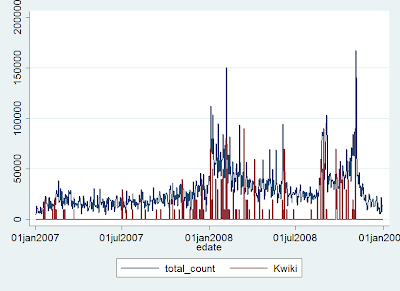Here are the results, as a line graph. The red line is an aggregate tally of your responses. The blue line tracks total words of coverage devoted to the campaign. The two track reasonably well, taking into account the fact that news coverage often lagged actual events by a day. (I used newspaper coverage for this tally; presumably, evening TV coverage wouldn't have had this lag.)

When you chalk up the important stories, here's what you get. These are the top 10 stories from the election, tallied using three slightly different measures.
Your Responses
1. Reverend Wright controversy
2. Rep. convention; Palin joins ticket
3. Election day
4. Super Tuesday
5. Clinton concedes Dem. nomination to Obama
6. Iowa caucus
7. McCain suspends his campaign to work on the financial crisis
8. Obama makes his “PA bitter” comment
9. Dems vote to seat MI and FL delegates
10. Dem. convention
Computer version A (text volume)
1. Election day
2. Super Tuesday
3. Election week
4. Iowa caucus
5. NV and SC caucuses
6. Obama becomes presumptive Dem. nominee
7. McCain becomes presumptive Rep. nominee
8. Rep. convention; Palin joins ticket
9. Giuliani and Edwards withdraw
10. Dem. convention
Computer version B (IEM trading volume)
1. Election day
2. Rep. convention; Palin joins ticket
3. Final phase of the election
4. Election week
5. WA, D.C., MD, VA primaries
6. McCain becomes presumptive Rep. nominee
7. Super Tuesday
8. Democratic convention
9. NC and IN primaries
10. OR and KY primaries
What you see is that the computer gets a lot of things right (election day, Super Tuesday, the party conventions), but misses nuances that a lot of people thought were important. For example, the Rev. Wright controversy was the number one story in your responses -- almost everyone remembered it as a pivotal event in the campaign -- but it didn't generate that much media coverage, so the computer didn't see it as particularly important. I think it's an open question whether our memories are cloudy, or the computer's event detection is flawed.
If you're really into this stuff, here's a link to the paper. It's half baked, but feedback from the conference convinced me that the concept is worth pursuing as a research topic. Thanks again for your help!
No comments:
Post a Comment